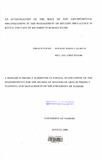| dc.description.abstract | KICOSHEP- K was established in the year 1991 and registered as an NGO under the
NGO coordinating act with the express mandate of addressing the plight of people
infected and affected by Hiv/Aids. Its overriding mission is to enable the community to
cope with the Impact of AIDS and enlist the participation of the community in reversing
the AIDS trend. Currently, KICOSHEP focuses on orphans and vulnerable children
programme (OYC), Home Based Care (HBC) and VC'T services, Youth Programme,
Income Generating Activities (lOA) and Training.
This study was meant to investigate the role, which KICOSHEP played in influencing
HIV prevalence rate in Kibera slum as one of the implementations of the Millennium
Development Goals n 6 in Sub-Saharan Africa. The study was conducted in Kibera slums
in Kibera Division, Nairobi Province - Kenya. The study was based on the following
objectives: to identify KICOSHEP specific Hiv/Aids management, influencing Hiv/Aids
prevalence rate in Kibera slums; to assess the efficacy of KICOSHEP HivlAids
management in reducing Hiv/Aids rate in Kibera slums; to identify the major constraints
facing KICOSHEP Hiv/ Aids based programme in Kibera.
The research design employed in this research project was "qualitative research method",
which consisted in three types of data collection: (I) in-depth opened-ended interviews,
(2) direct observation, (3) and documents analysis. The "qualitative research method"
helped the researcher to ascertain the impact of KICOSHEP in reducing HIVinfection
rate in Kibera slums. Statistical Package for Social Scientists (SPSS) program was used
to analyze the multivariate data.
The study discovered that there is a general feeling from the data' analysis from the
questionnaires C that there is a need to empower both KICOSHEP managers as well as
their beneficiaries so that they could implement successfully HIV reduction rate in Kibera
slums. | en |

